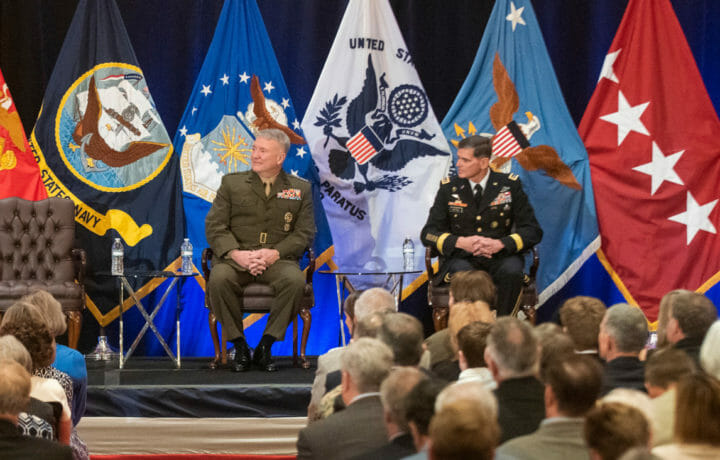Retired Generals Frank McKenzie (USMC) and Joseph Votel (U.S. Army) spoke out this week on VOA as they examined the fallout of the U.S.-led NATO abandonment of all security partnerships with the Afghan security forces. These two generals commanded the U.S. Central Command (CENTCOM) from 2016-2022. They oversaw military operations in the Middle East and advised Presidents Obama, Trump, and Biden on the U.S. war strategy in Afghanistan. Their bottom line is that America is now less safe due to the lack of awareness of Afghanistan and Pakistan-based terrorist activity.
All or Nothing Myth
Both Votel and McKenzie agreed that any advice that said America would be safer if all U.S. forces were removed from Afghanistan was misleading. McKenzie, who advised the presidents to retain 2,500 forces, said that it was necessary to keep forces at the Kabul and Bagram Airfields to support the ongoing needs of the ANDSF, and control the vital contractor services that kept the Afghans capable on the battlefield.
The advise and assist mission that Votel oversaw before McKenzie was not large, but they had the ability to safely operate across the nation to keep the Taliban-Haqqani forces in check, and kept Pakistan from helping launch a massive assault on Afghan cities, including the capital. Although 2,500 U.S. forces would not have allowed the advisory mission to continue, it would have allowed the U.S. and the NATO forces who would have remained to keep the Afghans in good fighting shape from afar. Much of the advisory work by 2020-21 was done via WhatsApp and other messaging systems, and no longer needed in-person proximity.
Votel discussed the false narrative of “forever wars.” That concept caused many in D.C. under numerous administrations to lose sight of the impactful capacity of small pockets of military members forward deployed in the region. Votel explained that the “forever war” political narrative “overtook smart, strategic decision making” in Washington. “I just don’t buy the idea that we had to pull everybody out,”
Like many others advised both D.C. and Brussels, Votel felt that the Western forces in Afghanistan were an affordable “insurance policy.” The removal of forces signaled to the Afghans that they were being abandoned and led to a deep sense of betrayal among the Afghan people. Without U.S. forces on the ground, Votel felt the U.S. would not be able to “continue to look after our national security interests that are present in that country.”
Both Generals also noted that the catalyst for the collapse of the Afghanistan republic was the desire of multiple leaders to remove every single soldier from the country. Following the Doha Agreement, the announcement of a full withdrawal in 2021 started the rapid decline of the morale of the entire nation. Losing their will to continue fighting alone, as NATO nations quickly joined the US in announcing their departure.
Votel said, “We failed to appreciate the impact of a political narrative…the effect that had on the psyche of, of not only Afghan forces, but the Afghan people and certainly the Afghan government.”
Boots on the Ground
What exactly would a small force on the ground have been able to do is the biggest question for most Americans who were still following events in Afghanistan. As General McKenzie explained, his plan was for “a small, very hard platform in a series of bases in Afghanistan that would have included Bagram Air Base. It would have given us the ability to continue to support the Afghan logistics system, would have given us the ability to continue to support the Afghan Air Force on the ground. I believe it would have given us the opportunity, along with the 4,000 or so NATO troops that would have stayed with us, the ability to continue to influence Afghan operations on the ground.”
We are Not Safer
Few leaders have as much recent experience evaluating Afghanistan than the two men who studied it daily for the last six years. Their words should be taken to heart in near-term policymaking, as all current assessments show that terrorists are more active and openly defiant in Afghanistan today than they were just before September 11. McKenzie shared, “I do not believe we are safer as a result of our withdrawal from Afghanistan.” Votel offered similar thoughts, saying, “There’s a lot that we don’t know about the organizations, the terrorist organizations that are left on the ground…I don’t think we’re more stable or more safe. I think Afghanistan is more unstable, and as a result, that this region is more unstable.”



